Warning: This article contains spoilers for Fantastic Beasts and Where to Find Them! Proceed with Caution.
Fantastic Beasts and Where to Find Them, the first of a five movie saga (what happened to nice clean trilogies?), is now downloadable! Thus, yours truly has finally watched it after missing the initial theater release. The next installment of films set in Rowling’s wizarding world received pretty good reviews. However, like most of what we’ve seen out of Rowling recently, out of all the possibilities of expansive and interesting stories teased in her original novels, following Newt Scamander wasn’t the most initially enticing.
Yet, the Potter nerd within me couldn’t resist. I found the film quite enjoyable, actually. It’s definitely a step up for David Yates as director after he produced what I considered the worst of the Potter films. Yet, I found myself incredibly frustrated by the the b-storyline centering around Grindelwald.
Why Newt?

First of all, the filmmakers announced the series would be following Grindelwald, not Newt. The fifth film will end in 1945 with the infamous battle between Grindelwald and Dumbledore. With that in mind, Fantastic Beasts seems like the wrong place to start this series.
Newt barely worked as a character for me. He only came alive those moments when we were in his case with him. Had they wanted to make a standalone film about Newt, he would have made a fine protagonist. And it makes me wonder if that’s what Fantastic Beasts had originally been meant to be.
Is he exceptionally interesting? No, but definitely adequate. The message, which often felt lost in all the hubbub, of protecting the rights of magical creatures would have made a strong theme for his own movie. (I won’t bring up the fact that he had had a muggle animal carcass lying around in his case, cause that’s different). In a world where we missed out on seeing Hermione’s fight for Elfish welfare in the film adaptation of Goblet of Fire, seeing more of the wizarding prejudice and cruelty brought to life would have been interesting.
Which then leads me to ask, does Newt not care about the rights of House Elves either? Is Hermione the only witch to have ever given a second thought to the enslavement of a magical creature? A creature so commonplace in the Wizarding community? Sorry for the tangent but Newt may need to extend his ideals beyond the animal world.
In the film, we hear Newt mention more than once that he’s attempting to “gently” teach his fellow wizards about compassion for their fellow magical creatures. It totally reminded me of when I not-so-subtly attempted to educate my friends and family about veganism (not that I think the film is about veganism). But, it was the one point in the movie where I connected to Newt and what he wanted. It was a strong core of ideals for his character, but it was lost as soon as the bigger plot with Credence and Grindelwald took center stage. Newt actually seemed unconcerned with Credence at the end of it, yet Credence could have fixed the focus issue. He could have brought Newt’s wants and values into the overarching plot of the series and tied it to Grindelwald.
Despite the potential plot with Newt and magical animal rights, this is the setup of a five film series about Grindelwald, his rise and his fall. We’re meant to understand this will lead us to the final battle with Dumbledore before he’s thrown into Nurmengard. The subtlety of weaving in a dark power wreaking havoc on the wizarding community and the panic and fear that it induces was an intriguing setting. It could have worked well, but instead the film functions as if it were a set up for two different franchises.
What do I mean by that? Fantastic Beasts could have been many things. It could have been the jumping off point for a series about Newt. A series about his adventures fighting for the rights of magical creatures. This could have been an interesting inciting moment where this scholarly wizard had his one brush with the greatest dark wizard of all time (before Voldemort). It would have also worked to establish the general panic, confusion, and fear that someone with Grindelwald’s power and message can create. Thus, it could have set the tone for a separate Grindelwald series as well.
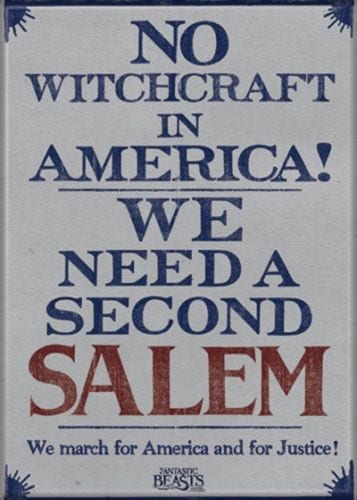 Instead, we’re meant to believe that this was the setup for a single story with both of these plots. Somehow Newt Scamander, studier of magical creatures, is intwined with Gellert Grindelwald. Grindelwald who was the biggest threat to the world before Voldemort’s rise. It’s not believable, and it’s also not interesting. With Newt at the center, the threat of Grindelwald holds no weight. Newt’s not effected by any of it. We see this when he strolls unaware and unprepared into the current state of hysteria in New York.
Instead, we’re meant to believe that this was the setup for a single story with both of these plots. Somehow Newt Scamander, studier of magical creatures, is intwined with Gellert Grindelwald. Grindelwald who was the biggest threat to the world before Voldemort’s rise. It’s not believable, and it’s also not interesting. With Newt at the center, the threat of Grindelwald holds no weight. Newt’s not effected by any of it. We see this when he strolls unaware and unprepared into the current state of hysteria in New York.
Not to mention that within all that, Rowling, paints Grindelwald into the antithesis of what he functioned as in her original novels. It happens before our very eyes. We see the three dimensional and dynamic possibility, along with Colin Farrell’s compelling performance, fade into the bland piece of one dimensional cardboard cutout of evil that is Johnny Depp’s older Grindelwald.
Where’s the Nuance?
I must confess that I was one of the few fans who, when craving more content and more stories set in Rowling’s sprawling world, thought not of the Marauders but rather of Dumbledore and Grindelwald’s origins. The pair had always intrigued me. Their relationship and what it meant to both of them broke down the caricatures. It deconstructed the wise mentor archetype that Rowling saddled Dumbledore with in the beginning of the tale. It granted nuance to a face of evil that we had failed to see with Voldemort.
Voldemort was always the embodiment of pure evil, unable to change, never faltering. Grindelwald was the opposite. Grindelwald and Dumbledore are essentially the Magneto and Professor X of Harry Potter. While Grindelwald’s horrific ideals of “the greater good” are terrifying and the atrocities he committed to achieve it unacceptable, he wasn’t as black and white as Voldemort. He and Dumbledore started in the same place in Godric’s Hollow and only ended up so far away from one another due to Ariana.
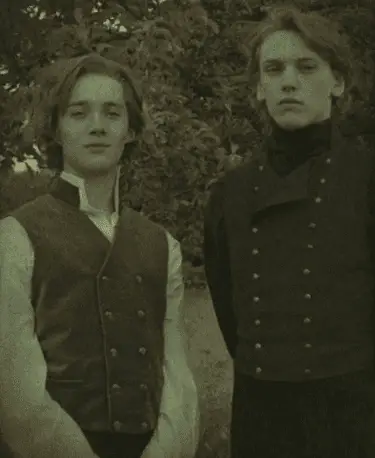
The way he acts as a foil for Dumbeldore only goes to show that Grindelwald isn’t “pure evil”. He’s horrific and a villain, no doubt, but the nuance is what makes him intriguing and all the more horrifying.
Dumbledore, as he states in the “King’s Cross” chapter of Deathly Hallows, could be Grindelwald. He wasn’t so far off, nor were his ideals. He states that if Ariana’s death hadn’t put things into perspective for him, he would have gone down that path. Had he ever sought a position of power, like the Minister of Magic so often offered to him, he could have regressed. He could have returned to being the Dumbledore huddled over papers with Grindelwald speaking of the “greater good” and the Hallows in Godric’s Hollow. Very little separates the two. It’s that relationship, that core bond and similarity, that forced the two against one another in the end. It’s also what is so intriguing.
Grindelwald was power hungry, idealistic, and willing to do whatever it took to achieve his goals. (Sound familiar?) He believed that the true place for wizard kind was not in hiding. Their power meant they were destined to rule the Muggles. Grindelwald thought that a reclamation of their power would be for the best for everyone. That Muggles would be safer and better off under wizarding rule. “For the Greater Good,” as he put it.
As I hinted at earlier, its the Magneto and Professor X argument about mutant kind. It’s not all that subtle, but it is ever so effective. After all, any time those two meet, their middle ground is the most intriguing part of their confrontations. Same with Grindelwald and Dumbledore. Grindelwald doesn’t want to kill every Muggle and Muggle-born like Voldemort. Voldemort’s ideal of a mass extermination is so evil one can’t deny his utter vileness. There’s no going back for a villain that evil, which is the climax of Harry’s final battle with him. Harry realizes there’s no saving someone like Voldemort even as he urges remorse.
Grindelwald is supremely horrific and commits horrible crimes in the name of “the greater good”, most definitely. But, in the end what makes him different and more interesting is that there are (very) small points of his argument that are understandable. It was the ground on which he and Dumbledore first walked on in Godric’s Hollow, even before they stumbled upon the whole “greater good” mentality.
He is human. With that humanity comes empathy. Not sympathy, for sure, but understanding. At the point in Dealthy Hallows when Voldemort confronts him to secure the Elder Wand, it becomes strikingly clear the two forms of villainy Rowling was painting. Voldemort, lusty and hungry for power, never stops. He never changes or relents. He is willing to do whatever it takes to kill Harry Potter, rule the wizarding world, and submit Muggles and Muggle-borns to mass persecution and execution.
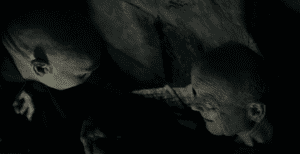
Grindelwald, however, shows a shred of remorse. His final act shows that his years at Nurmengard actually changed him. He was changeable. When Voldemort asked him for the location of the Elder Wand, instead of confessing the truth and telling him Dumbledore won it in their infamous duel, he lies. He claims he never had it, knowing full well that his life would end there and then. Instead of allowing Voldemort to break into Dumbledore’s tomb, Grindelwald evinces the lingering and long-thought lost humanity that has always been inside of him. He uses the last moments of his life to do the only thing he could do to make what little amends he could to his old companion.
Perhaps we should have known the film series would destroy all this nuance. It should have been obvious when this scene played out on our screens in the first part of the film adaptation of Deathly Hallows in a very different way. Instead of securing the end of his life by concealing the place of the Elder Wand and the sanctity of Dumbledore’s tomb, Grindelwald outright tells Voldemort its location and final possessor. After that it should have been clear. It should have shown us that this was the Grindelwald the films would be interested in adapting.
Although with Rowling at the helm of Fantastic Beasts one would have hoped for something different. Where’s all that nuance Rowling? You gave him more nuance on those few pages than you did in the movie he was actually present in.
Touching on that nuance would have been perfectly exemplified by the involvement of the film’s ultimate plot point: the introduction of the Obscurial. An Obscurial is a young witch or wizard that, after years of suppressing their magic due to some sort of trauma, develops an Obscurus. They often lose control, leading to violent outbursts of dark and powerful magic.
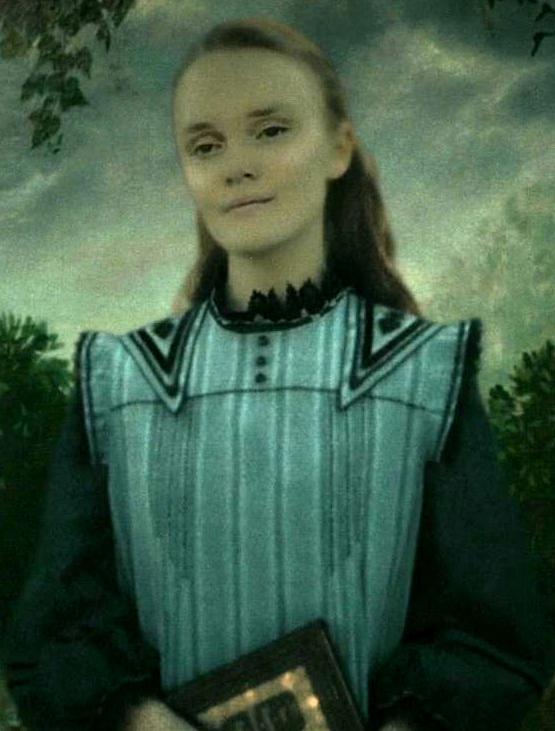
It’s hinted that Grindelwald had an encounter with an Obscurial before, an encounter that would change his life. Muggles harassed Dumbledore’s younger sister, Ariana, for doing magic. They had seen how this trauma ultimately lead to her refusal to use her powers. Her suppression led to violent outbursts that she couldn’t control, as described by Aberforth Dumbledore in the novels. And Ariana was what drew the wedge between Dumbledore and Grindelwald. She not only represented a home that he couldn’t leave after his mother’s death, but also the future that he and Grindelwald hoped to build together.
People like her were a driving force for people like Dumbledore and Grindelwald and their frustration with wizard-kind hiding and cowering, afraid of detection.
He told me what a stupid little boy I was, trying to stand in the way of him and my brilliant brother…didn’t I understand my poor sister wouldn’t have to be hidden once they’d change the world, and led the wizards out of hiding, and taught the Muggle’s their place? – Aberforth Dumbledore, Harry Potter and the Deathly Hallows
Grindelwald-as-Graves has a line after the MACUSA kill Credence. He asks them who that law actually protects. What kind of law is it when it leads to this type of emotional and psychical abuse of children? Who does it protect when it leads to the death of a kid who just needed help? Like Magneto, this type of a villain has a valid point. He has seen suffering and wants to act on it. It’s infinitely more interesting than a pure evil, power hungry maniac. The humanity makes him all the more terrifying because you can understand where it’s coming from.
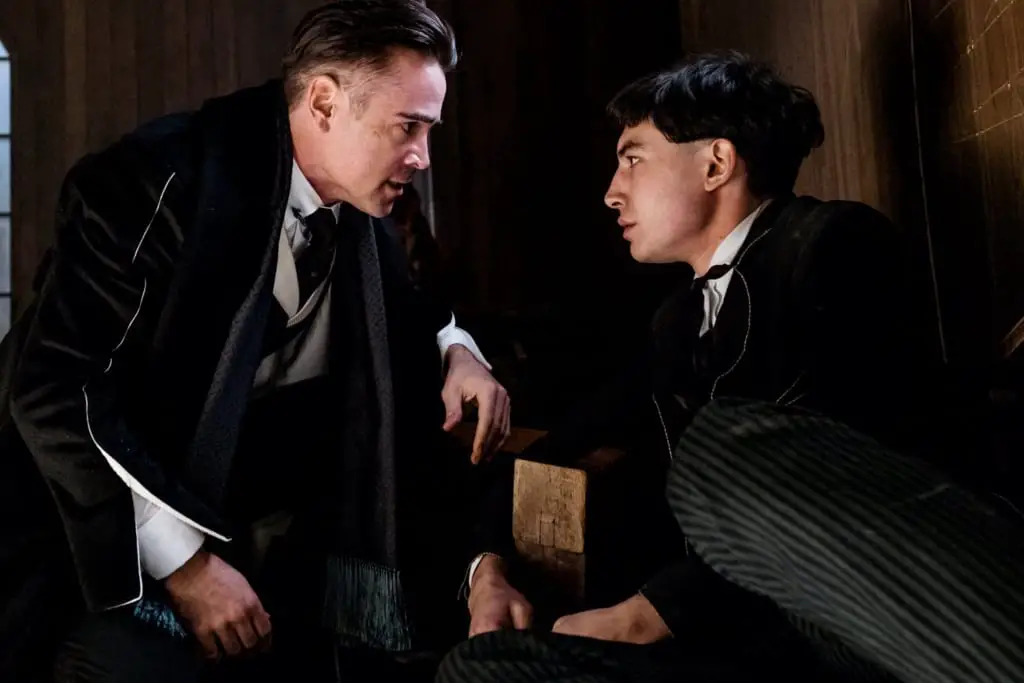
Yet, the relationship with Credence isn’t stressed. At least not to the point where you would ever think Grindelwald actually cared about his second interaction with an Obscurial. This was his second chance. His moment to perhaps save someone this time. However, leaving all that out left the powerful line of his to the MACUSA flat. In what seems to be a scene that is the opposite of subtle or nuanced, he even tells Credence that he is a worthless squib. This causes Credence to reveal his true nature as the Obscurial in anger. It was ‘evil villain dialogue’ to a T.
Then, at the end, after the MACUSA blast a tormented and abused child to death for their law (would that be “for the greater good” then?), I found myself siding with him. Or at least I did, while I thought he was still Graves. But no one else in the film does, and our protagonists certainly don’t. In fact, they barely have a reaction to anything going on in that moment at all. No one cares about what Grindelwald-as-Graves is saying, but he brings up a good point.
There’s a layer to his argument that makes sense and after seeing an emotionally and physically traumatized child killed before your eyes. You should question the morality of the MACUSA, who, after all, made use of the death sentence earlier in the film. You understand what Grindelwald means and that’s both what is interesting and what is scary. He’s right. Who is their law protecting? What makes them so different than him? They’re just fighting for the protection of opposite sides. It doesn’t make what he’s been doing to make his point morally right, but he does have a point.
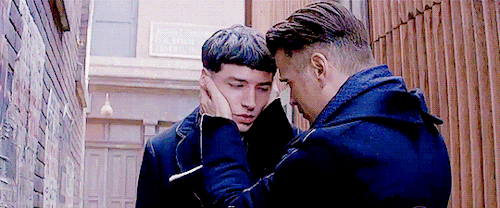 When you kill abused children in the name of the law, there’s more going on here than the black and white battle of good versus evil. However, without thinking or hesitating, our protagonists immediately side with the MACUSA, securing Grindelwald’s capture. There’s no hesitation. Seeing as how they are meant to be our eyes into the story, we aren’t supposed to second guess the MACUSA’s actions either.
When you kill abused children in the name of the law, there’s more going on here than the black and white battle of good versus evil. However, without thinking or hesitating, our protagonists immediately side with the MACUSA, securing Grindelwald’s capture. There’s no hesitation. Seeing as how they are meant to be our eyes into the story, we aren’t supposed to second guess the MACUSA’s actions either.
The point of Grindelwald is that he’s supposed to be able to gain reasonable supporters and not just bigots. He’s playing on something many wizards have feared and thus they find a champion in his ideals. The Obscurial plot line should marry perfectly well with that notion, but instead it’s barely an afterthought.
Not to mention the god-awful look they gave Johnny Depp at the end. He looks less human than Ralph Fiennes’ Voldemeort. A monster persona is the opposite of what Grindelwald represents. Not all bad wizards are inhumanely bad. Not all bad wizards are uniquely flat out evil. It’s why the most interesting moments of Voldemort are his memories, when we see him before he went past the point of no return. Grindelwald inhabits in this grayer realm (in the books, that is). It’s a realm of nuance. But instead, Fantastic Beasts paints him as a horrifying one note monster, from his appearance down to his behavior.
What’s that? Questionable Implications?
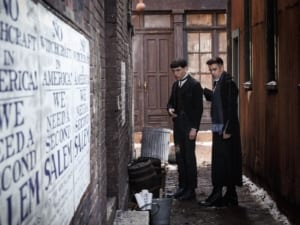 Implications! My favorite subject! Many have already called Rowling for citing Dumbledore as gay “representation”. Meaning he’s gay despite the fact that it is never outright stated in the novel, only presented as subtext. Yet, on expanding Dumbledore and Grindelwald’s relationship as well as their characters in Fantastic Beasts, Rowling has a chance to correct her wrongs. Although, judging by her interviews and what has been set up in this film, it seems like she might only be digging herself further into a hole.
Implications! My favorite subject! Many have already called Rowling for citing Dumbledore as gay “representation”. Meaning he’s gay despite the fact that it is never outright stated in the novel, only presented as subtext. Yet, on expanding Dumbledore and Grindelwald’s relationship as well as their characters in Fantastic Beasts, Rowling has a chance to correct her wrongs. Although, judging by her interviews and what has been set up in this film, it seems like she might only be digging herself further into a hole.
According to Rowling, Dumbledore’s feelings for Grindelwald were never reciprocated. Instead, the relationship we see play out between Grindelwald-as-Graves and Credence in Fantastic Beats is more or less what conspired between the two young men that summer in Godric’s Hollow.
I think he was a user and a narcissist, and I think someone like that would use it, would use the infatuation. I don’t think that he would reciprocate in that way, although he would be as dazzled by Dumbledore as Dumbledore was by him, because he would see in Dumbledore, ‘My God, I never knew there was someone as brilliant as me, as talented as me. Together, we are unstoppable!’ So I think he would take anything from Dumbledore to have him on his side.- J.K. Rowling
We once again see gay sexuality as subtext in Fantastic Beasts. It’s a subtext painted more as an allegory than a piece of representation. Not to mention that if the relationship we see between Credence and Grindelwald-as-Graves is what Grindelwald’s relationship with Dumbledore was like, there is an alarming sense of manipulation and victimhood that comes with Rowling’s one and only instance of “representation”.
Why does it have to be one sided and abusive? In this film franchise, she has what most authors do not. She has a chance to correct herself on something she has been criticized for in the years since she wrote the books.
There is also something more realistic and vivid about a fast and toxic summer fling than a fast and toxic friendship. Romances move fast. People get in deep quickly. It also presents a more apt relationship and arc for the two of them if they actually did care about one another equally (once again reminiscent of Professor X and Magneto). There’s more meaning to what would be one of the most epic duels and climaxes at the end of the series. It also adds more weight and understanding to Grindelwald’s final moments in the book if he wasn’t just using Dumbledore or narcissistically attaching himself to his genius.
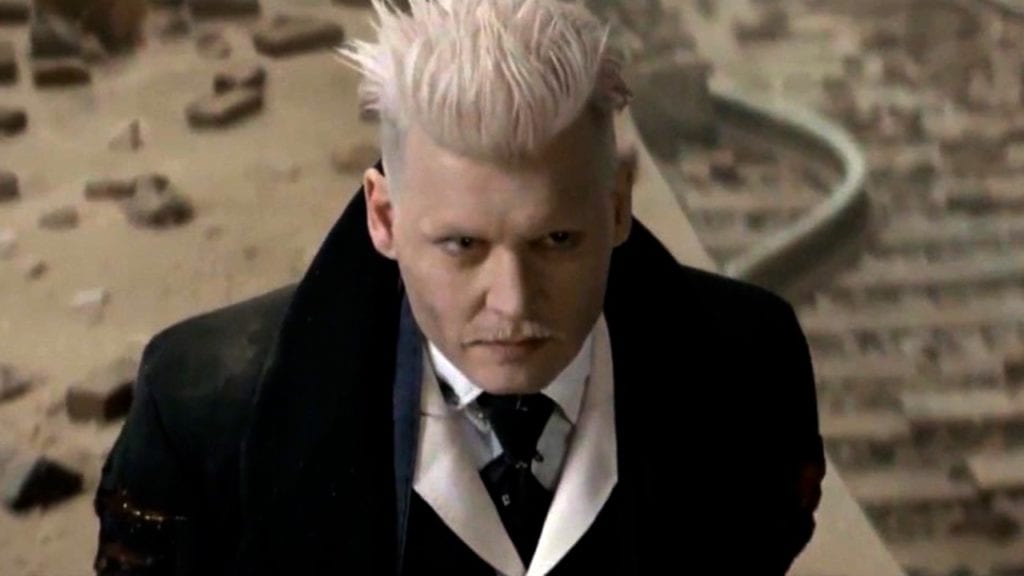
Instead of any of that, this is what we’re getting as our one piece of “representation”. If that’s all Grindelwald felt for Dumbledore, if what we see with him and Credence is essentially what went on in Godric’s Hollow all those years ago, that final battle that the series is presumably amping up to loses its dimensionality and power. Rather than two men who had deeper feelings for one another, feelings that ended in a rupture and an event that both of them seem to regret and want to forget. Rather than a confrontation with each other and a truth they pushed out of their minds for so long coming head to head, we’re getting a good guy and a bad guy.
Instead of seeing them come to wizarding blows after denying something within them to be able to continue on their paths. Instead of making that connection something deeper, we’re most likely getting a grand but flat, action-packed battle at the end of the series reminiscent of what they did with the final battle in the final Harry Potter film. We’re getting a manipulative and abusive force of evil and his victim. Now, that is a valid story to tell, but one far less interesting that what we could have gotten. Not to mention the fact that, once again, the gay ‘relationship’ was only subtext, which doesn’t give much, if any, hope for the future.
Also….why Johnny Depp?! I might have let out a sad cry when Colin Farrell and his ridiculously good performance as Grindelwald-as-Graves (seriously he was one of the two standouts) faded right before our eyes and turned into the bland and horrific bleach blond Grindelwald that Johnny Depp will be playing in the rest of the films. Why are they even casting him in things anymore? And why, when you have Colin Farrell at your disposal, do you waste a performance like that for what this ultimately was?
I could go into the fact that there are abuse allegations against Depp from Amber Heard that include a great deal of biphobia. Not a great choice of actor for someone who is playing the second half of what is the only canonically gay coded relationship in the series. But I won’t.
At the end of the day, like Rowling’s original material, there is a strength at the core. There’s undeniable thematic value. However, when translated and adapted, it has lost any and all of its nuance. For now, I think I’ll have to accept that as I watch these films come out for the next eight years. I’ll have to bury the dream of mine to see a properly done Grindelwald and Dumbledore series in the ground, along with the little bit of nuance Grindelwald’s book counterpart had.

